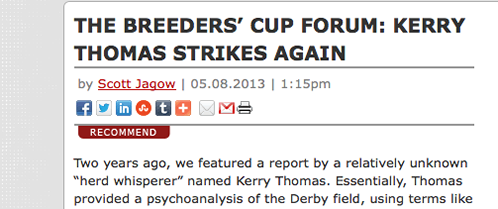The Unethical Report
Sometimes I miss the Thoroughbred Times, and not just for their reporting and analysis, but because TT staffers and contributors were some of the few in racing media who pushed back on the Paulick Report and its unethical aggregation practices. Since its launch in 2008, the Paulick Report has succeeded by publishing its own original content — and by aggregating the original work of others, rewriting and condensing that work into 1-5 paragraph summaries with a link to the original source at the end. The summaries appear on pages with comments and ads, and for most visitors, it’s one-stop racing reading. PR has been so successful with its approach that people regularly say of something that was actually published in Blood-Horse, Daily Racing Form, a major newspaper, or on a small blog that they “saw” it on the Paulick Report, giving PR credit for content it had no hand in producing.
Aggregation doesn’t have to be that way — aggregation can be ethical. Equidaily links directly to publications with headlines and short excerpts. Raceday 360 Wire — the aggregator I built, now owned by Hello Race Fans — links directly to sources with headlines and the first few words.
But there are reasons the Paulick Report way works. If you’re a visitor, it’s a convenient way to skim headlines and get some commentary or reporting you won’t see anywhere else. It has a lively community. If you’re a publisher, of any size, it’s not worth it — legally — to tangle over fair use, a hazily defined and easily abused standard. The traffic is supposed to be consolation — and for small publishers, it can be — the people who click through a PR summary to the full piece may not be as many as you’d like, but it’s probably more than would have seen your site without their link.

Featured: Screenshot from 5/9/13, 9:00 AM. No credit, no link to the original, and one misleading word.
It helps, too, that Paulick and company don’t usually misrepresent the nature of what they’re doing. Except, when they do, as in the opening sentence of a great interview Scott Jagow did with Kerry Thomas about his Kentucky Derby profiles. (Seriously, it’s an excellent interview with Thomas about his process and analysis. You should read it.) “Two years ago, we featured a report by a relatively unknown ‘herd whisperer’ named Kerry Thomas,” Jagow writes. What he means by “featured” is that they aggregated the report from the now defunct Kentucky Confidential (it can be read here in its entirety, if you’re interested). The report wasn’t “featured,” with all that implies about original publication and presentation — it was given the typical Paulick Report treatment. If the opening sentence of the interview reflected that accurately — if Jagow had used a word such as “linked,” or a phrase such as, “called attention to,” all I’d have to say here is, read that great interview with Thomas.
Because of that word, though, I emailed Paulick and Jagow with a request to change it. Paulick’s response to me was that since I didn’t complain about the aggregation of Thomas’ analysis for Kentucky Confidential in 2011, and agreed to a business relationship between Kentucky Confidential and the Paulick Report in 2012 (PR sold the KYC sponsorships; KYC linked to PR with a “Presented by …” banner on the header of every page), I shouldn’t protest “featured” now. But there is a difference between aggregating original work and misrepresenting the presentation of that aggregated work. The former may or may not be theft, but the latter is most certainly a lie.
5/11/13 1:50 PM Addendum: Sid Fernando, who curates a selection of daily racing “newspapers” on paper.li, thoughtfully expands on the issues of aggregation in a post today on his website.